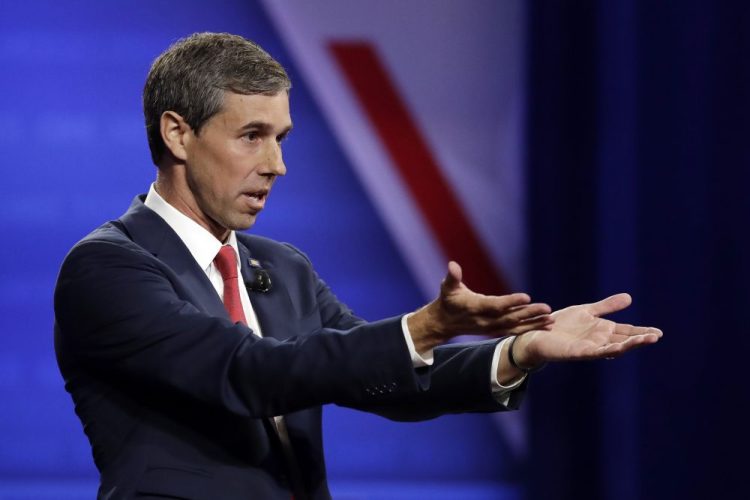Beto O’Rourke, the former congressman from Texas who burst to the national scene wielding excitement and enthusiasm, on Friday abruptly dropped out of the Democratic presidential race amid financial strains and a lagging campaign.
Two people close to him said that he would not run for U.S. Senate in Texas – as some had pressured him to do – leaving his future political plans in doubt.
“Though it is difficult to accept, it is clear to me now that this campaign does not have the means to move forward successfully,” O’Rourke wrote in a Medium post published Friday afternoon. “My service to the country will not be as a candidate or as the nominee.”
The move marked yet another sign of the dwindling of the Democratic primary field, one that is being reshaped by a handful of top candidates who have the financial resources to mount a campaign that could stretch deep into next year.
O’Rourke entered the race in March, causing an initial stir when Oprah Winfrey touted his candidacy and Vanity Fair featured him in a cover article. He met with President Barack Obama, who saw in O’Rourke some of the same hopeful political style that he rode to the White House. A documentary film about him premiered earlier this year at the South by Southwest festival.
The attention stemmed from his long-shot race against Sen. Ted Cruz, R-Texas, in 2018, in which he turned a number of viral moments and a massive fundraising haul into a narrow defeat – one that signaled his promise in a red state.
But he was not able to duplicate in the presidential contest the fundraising and campaigning prowess he demonstrated in that race.
He attracted top political talent – Jennifer O’Malley Dillon, one of the most sought-after Democratic consultants, was his campaign manager – and he had one of the best fundraising hauls for his first day as a presidential candidate.
But his spontaneity – jumping on countertops, driving his own car, and treks off the beaten political path – never fully translated into a meaningful presidential campaign for voters. He struggled in debates, switched his themes and focuses often, and was uncomfortable with criticizing fellow Democrats.
He was also struggling to meet the polling threshold to make the stage in the next debate.
“I decided to run for President because I believed that I could help bring a divided country together in common cause to confront the greatest set of challenges we’ve ever faced,” O’Rourke wrote in his blog post. “I also knew that the most fundamental of them is fear – the fear that Donald Trump wants us to feel about one another; the very real fear that too many in this country live under; and the fear we sometimes feel when it comes to doing the right thing, especially when it runs counter to what is politically convenient or popular.”
O’Rourke briefly stopped his campaign in August, after a mass shooting in his native El Paso. When he returned to the campaign trail, he reoriented his focus on gun control. He took bold stands – calling for a mandatory gun buyback program – that earned admiration from some Democrats and derision from Republicans.
Trump quickly mocked O’Rourke on Twitter as Friday’s announcement emerged.
“Oh no, Beto just dropped out of race for President despite him saying he was ‘born for this.’ I don’t think so!” Trump wrote, in a reference to a quote in the Vanity Fair article.
Texas Democratic Party Chairman Gilberto Hinojosa called O’Rourke “a fighter, advocate, and leader.”
“In the wake of the El Paso shootings, he made the entire country proud as he focused his campaign on ending gun violence and the rise of white supremacy,” he said in a statement. “Beto O’Rourke has done amazing things for the Democratic Party in Texas, and we look forward to his future.”
Steve Ortega, who once served on the El Paso city council with O’Rourke, said that he learned that his close friend had dropped out of the race when reporters called him on Friday evening.
“I’m proud of him. I’m proud of the race he ran. … Part of his charm is what hurt him in a race like this. He’s not testing and polling everything he says. He speaks from his heart. … He shot from the hip and wasn’t running the traditional campaign with the canned lines,” Ortega said. He said that while O’Rourke focused on immigration and gun control, voters in key states might have wanted to hear about other issues.
“I’m glad that he ran, being from El Paso, because he brought a needed voice to border issues and gun control issues.”
The news of O’Rourke’s decision slowly arrived at a rally he had planned Friday on the riverfront in Des Moines, Iowa. Tickets were still being distributed at an entrance, and some supporters expressed disbelief at the news, asking to be shown some proof.
Volunteers, some of whom had woken up early to decorate a park and line the road with signs, hugged each other, wept, and sometimes screamed expletives.
“I saw him in Sioux Center, the reddest place in Iowa,” said Tammy Growth, a 48-year-old pastor. “His willingness to listen to everyone is what attracted me to listen to him.”
Ryan Holliday, 40, who had traveled from Galveston, groused that “the knives came out in the media” for O’Rourke, and said he was hurt because he didn’t have years to plan a campaign like some candidates who outlasted him.
“It’s so disappointing that he did this before Super Tuesday,” Holliday said. “We have all these new voters coming out and we needed him to come to Texas.”
Jenna Johnson and David Weigel contributed reporting.
Copy the Story LinkComments are not available on this story.
Send questions/comments to the editors.


